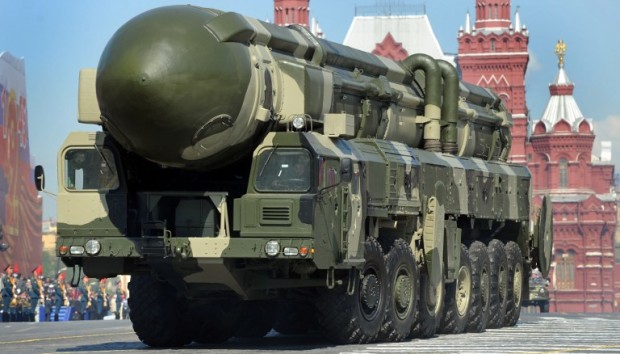Putin scraps plutonium disposal deal with ‘unfriendly’ US

This file photo taken on May 9, 2009, shows a Russian Topol-M intercontinental ballistic missile driving through Red Square in Moscow in commemoration of the end of WWII. Russian President Vladimir Putin on Monday ordered a halt to an agreement with the United States on weapons-grade plutonium disposal in retaliation for Washington’s ‘unfriendly actions’ amid a wider standoff with the West. AFP FILE
MOSCOW, Russia — Russian President Vladimir Putin on Monday ordered a halt to an agreement with the United States on weapons-grade plutonium disposal in retaliation for Washington’s “unfriendly actions” amid a wider standoff with the West.
The deal, signed in 2000, was meant to allow both nuclear powers to dispose of plutonium from their defense programs, a move seen as a key step in the disarmament process.
The two countries recommitted to the agreement in 2010.
Foreign minister Sergei Lavrov said the move was a “necessary” response to hostile steps from the US, including sanctions over the Ukraine crisis and the bolstering of NATO’s forces near Russia’s border.
“The decision that has been taken by us is a signal to Washington,” Lavrov said in a statement.
“It will not work out if they try to talk to Russia from a position of strength with the language of sanctions and ultimatums, but still want to maintain selective cooperation when it benefits the US.”
The suspension is symbolic of the breakdown in nuclear non-proliferation cooperation as ties between the two sides have hit their lowest point since the Cold War, but the Kremlin suggested it could review the move if Washington changed tack.
Putin charged earlier this year that the United States was not honoring the deal by disposing of plutonium in a way that allowed it to retain its defense capabilities.
The decree published Monday states that Russia is pulling out of the agreement “due to a drastic change in circumstances, the appearance of a threat to strategic stability due to unfriendly actions of the United States toward Russia”.
It claimed that Washington was “unable” to carry out the terms of the agreement and that Moscow “must take urgent measures to defend Russian security”.
‘General tension’
“It’s a symbolic gesture that demonstrates that the sides no longer cooperate in this sphere,” said independent military expert Alexander Golts, adding that it was not the first agreement to be suspended in the non-proliferation sphere.
Putin’s spokesman Dmitry Peskov told journalists that Washington has not honored the deal and “Russia no longer thinks it possible to carry out the conditions of the agreement alone” due to “general tension” between the two countries.
A bill submitted by Putin to parliament on Monday, which asked lawmakers to support the agreement’s suspension, indicated that some quid pro quo could still keep the deal alive.
The bill said that the agreement could be reinstated if Washington moves US forces out of countries that became NATO members after 2000, ends “all sanctions” and compensates Moscow for the financial losses resulting from them.
Lawmakers can vote on the bill as early as Wednesday, when the State Duma convenes for the first time since being elected last month in a vote that saw the ruling United Russia party sweep some three quarters of the seats.
The US-Russian Plutonium Management and Disposition Agreement obliges Moscow and Washington to dispose of no less than 34 tons of weapon-grade plutonium by irradiating it or transforming it into so-called MOX (mixed oxide) fuel.
The building of a MOX fuel reprocessing plant was opposed in the United States in the wake of the 2011 Fukushima nuclear disaster in Japan over safety fears and high cost of the project, which is already billions of dollars over budget.
US energy officials have pushed for using another method of disposal, calling for plutonium to be mixed with other substances and stored underground, but Moscow argues that any method to dilute plutonium is reversible.
Russia is locked in its worst standoff with the West since the Cold War over its 2014 annexation of Crimea and the conflict in Ukraine, and the US has accused Putin of “nuclear sabre-rattling”.
Tensions between the two sides have also recently ratcheted up over the conflict in Syria, where Russia is flying a bombing campaign in support of US-foe Bashar al-Assad. CBB














